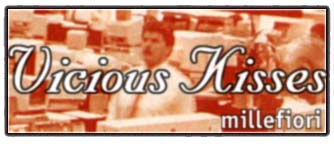
Eight years ago, I was a contented college frosh without enlightenment on two subjects: the poetry of Rainer Maria Rilke, and the proper administration of Prozac. I remember those days with an ache - the answers that came so easily, the cute little clothes I could wear, the way my slim, springy little ankles in my favorite purple tights swept so gracefully into black patent Fluevogs, the late nights passed laughing with friends under neon signs without fatigue or regret, the unmitigated energy and passion that drove every decision I made, every word I said. I was invincible, a goddess.
The next year, I learned that I was a goddess of fools, that my congregation mocked me in secret, and that the high priest of my temple was about campus making offerings to other deities. It was a longer and more difficult fall than I care to provide further detail on here, and to make a long story short, I wound up on the couch in nervous collapse. My couch, and a shrink's couch. My temples were defiled and my statues toppled by former sycophants.
The people of my shrink's generation, I am sorry to say, were weaned on grainy black-'n'-white filmstrips detailing the awesome power of modern science and medicine, and the infusion stuck. She ushered me into her temple, a sterile pastel chamber where the priests brought the faithful into the ideal state - steady productivity - through various potions and mumblings. Therapy, prescriptions, singsong chanting of vogue psychological buzzwords, all at enormous cost and with dubious benefit, at least gave me tidbits of conversation to offer, if they didn't restore me to fitness.
The problem was that steady productivity wasn't, and still isn't, my ideal state. Joy was what I missed about the old days. Dancing all night. Ecstatic states, uncontrollable laughter, spurts of creative energy where I wouldn't eat or sleep for days, I'd just write, or draw, or make SOMETHING beautiful, that's what I wanted. I remember when I first saw the face of God, when I first reached up with my infantile hand and stroked the wheel of eternity - I remembered my former majesty through these years of medically-authorized treatment, and the comparison was bitterly unfulfilling.
One Saturday night while anesthetized by my cheerful little dose of antidepressants, I was reclining on my couch watching a movie, "Awakenings," which inspired me to read the poetry of Rainer Maria Rilke. And one of his poems, in turn, inspired me to tell my shrink what she could do with her hastily and indifferently scrawled prescriptions that numbed my mind.
The withdrawals from my FDA-approved addiction left me helplessly leaden and hebetate for weeks. Once free of my torpor, however, I knew I could match the force of my malaise with the will of my mind. I was liberated, if only because I chose to dwell in my own prison rather than someone else's.
It isn't that the Tenth Elegy alleviated my depression or reduced my pain. It's that it showed me that pain and disease is what makes life complete, it's what makes the joys joyful and the happiness sincere.
"And we, who have always thought of happiness as rising, would feel the emotion that almost overwhelms us whenever a happy thing falls."
There is no purpose in life where suffering is suppressed, where the vivid colors of experience are dulled into shades of gray that make you comfortable being a complacent and productive member of society, a drone, simply because the lack of suffering robs from you the power to imagine anything else.
"How we squander our hours of pain. How we gaze beyond them into the bitter duration to see if they have an end. Though they are really our winter-enduring foliage, our dark evergreen, one season in our inner year - , not only a season in time - , but are place and settlement, foundation and soil and home."
It's been five years since I ingested anything that would have deprived me of my right and dessert as a human to suffer pain. Yes, I said dessert, and any person who believes he/she has the right to do what pleases them and doesn't deserve despair and frustration deludes themselves piteously. Humans are miserable, grasping, ridiculous and selfish creatures, and collectively they have earned more suffering than they have time left to expend.
The laughter and passion is much more sparing in my existence than it formerly was. The brilliantly creative moments are few and far between. I speak and move in a haze of misery and depression studded with sparks of anger and conviction, and that's just the way it is. It's the rarity and spontaneity, not the frequency or duration, of my lucid ecstasies that makes life worthwhile.
